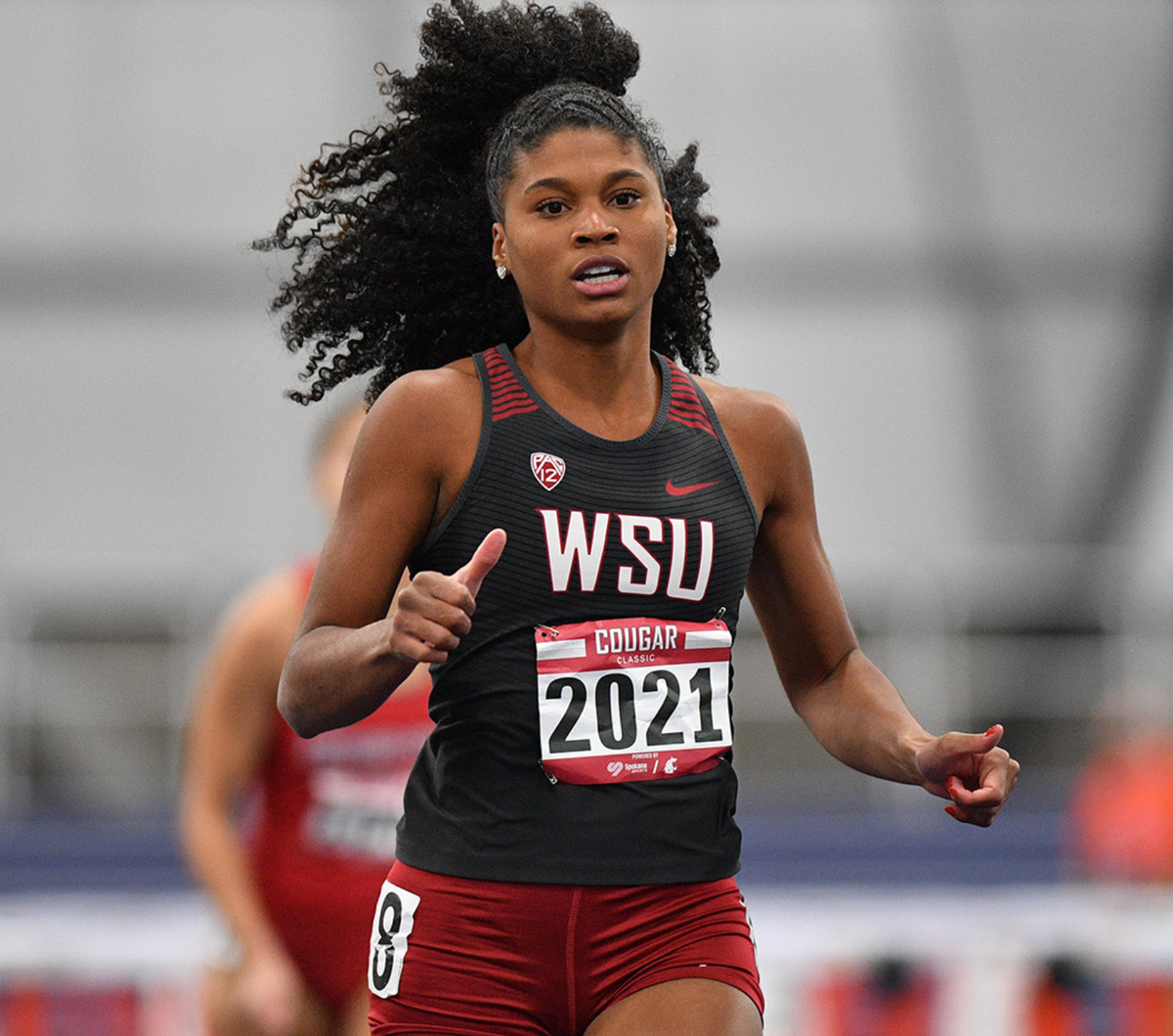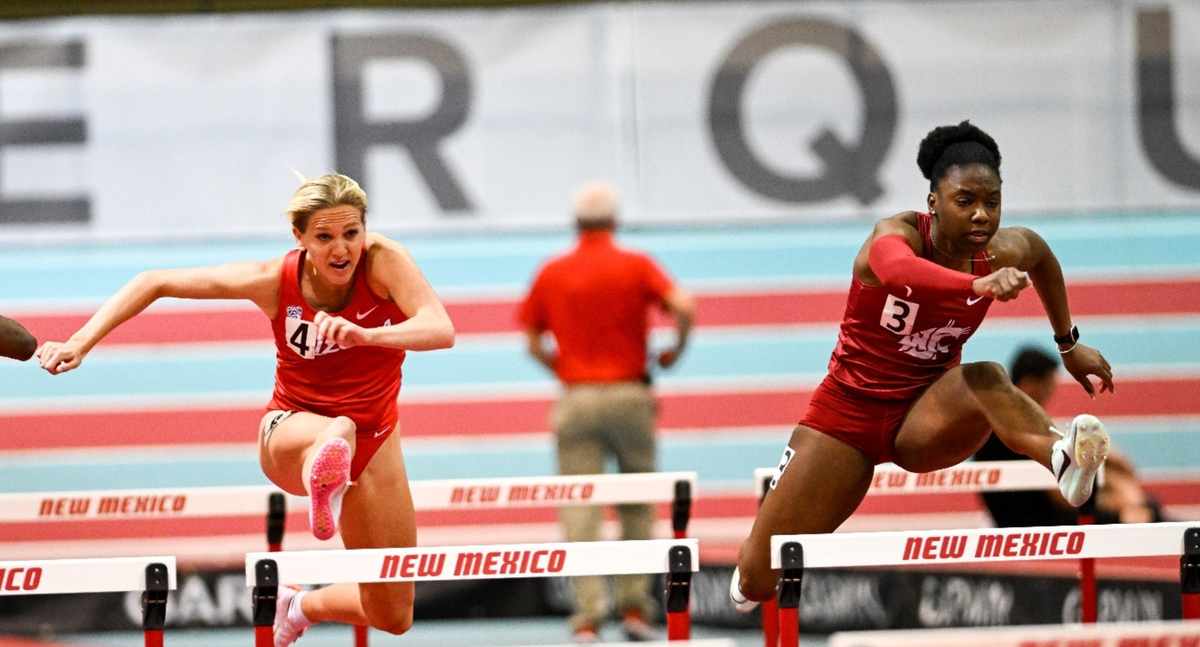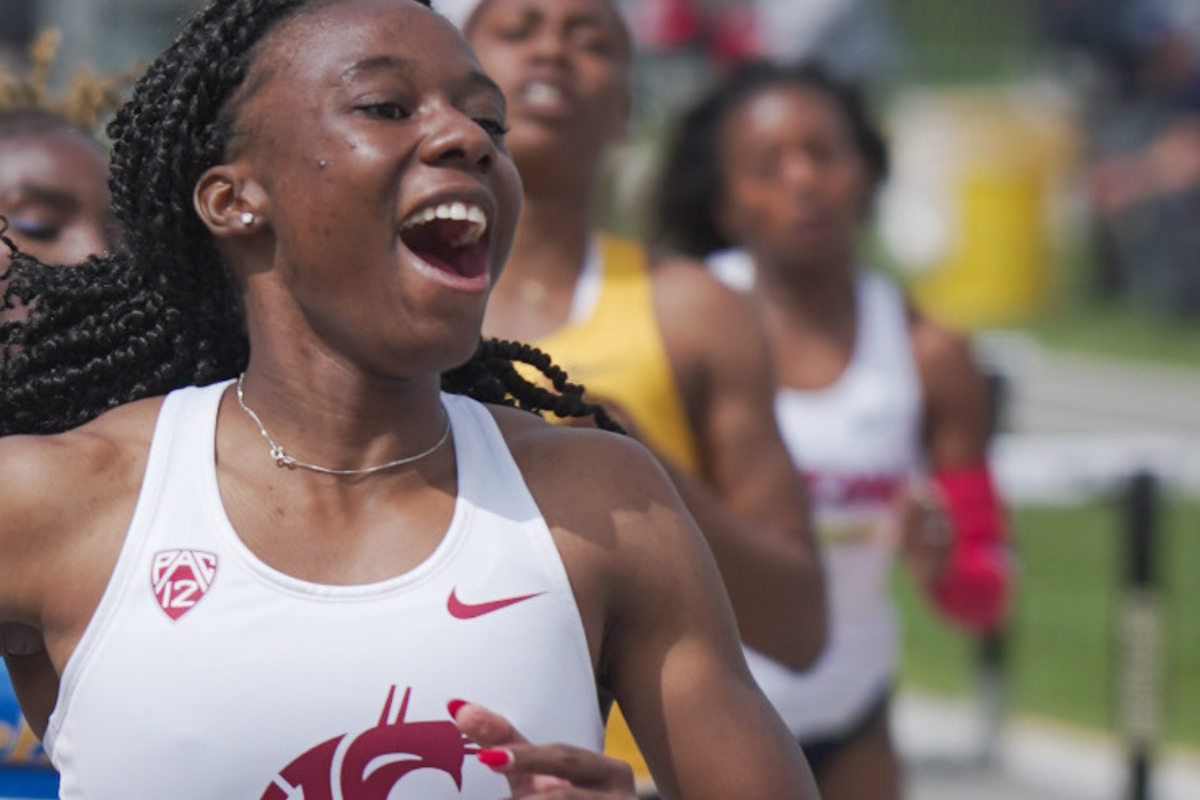‘We push each other’: South American hurdlers Maribel Caicedo and Micaela De Mello have rewritten Washington State’s record books
Washington State sprinter Maribel Caicedo, right, has a chance to win a national championship in the 100-meter hurdles at the NCAA Track and Field Championships in Eugene. (Courtesy of WSU Athletics)
When Maribel Caicedo was 10 years old, an aunt took her to the nearest track in Ecuador’s biggest city and enrolled her for “vacation training,” or what’s known in the states as keeping the kids occupied.
“For one month,” Caicedo said, “and look at me now.”
But don’t blink. She’s the fastest female hurdler on an American college campus, and her race is generally over before you can get the binoculars out of their case.
Her Washington State University teammate, Micaela De Mello, is rarely more than a half-step behind. She got her start at age 6 in her native Brazil, nudged by a mother who ran the 400 and 800 meters in her youth. As a result, De Mello herself didn’t really warm to the hurdles until she was 16.
As might be expected, how two women from another hemisphere have managed to rendezvous in Pullman to do rewrites of the school record book – in an event in which there are 10 obstacles to doing so every time out – required a journey that was something other than a straight line down an all-weather track.
This week it has them in Eugene for the NCAA Track and Field Championships, where Caicedo has established herself as a favorite in the 100-meter hurdles and De Mello a threat to score – in a race the Cougars never had an All-American until these two turned up on campus one year apart.
“We push each other,” De Mello said. “I know that has helped me a lot and hopefully it’s helped her.”
How much it’s helped crystallized two weeks ago in Fayetteville, Arkansas, during the preliminaries of the NCAA West Regional qualifier. Running in the first of six heats, De Mello blasted out a lifetime best of 12.85 seconds, then watched Caicedo rock a 12.49 in the fifth heat – winning by nearly a half second in the year’s fastest collegiate time not aided by an excessive wind and 10th best in collegiate history.
Trailing wind pushed them even faster in the quarterfinals that determined the NCAA qualifiers – De Mello running 12.82, Caicedo 12.38 and avenging a Pac-12 Conference meet loss to USC’s Jasmine Jones, the NCAA indoor champion. Only three other collegians in history have run faster.
“I know she was disappointed after the Pac-12 final,” Cougars coach Wayne Phipps said, “so turning the tables meant a lot to her.”
So how did WSU suddenly become a magnet to speedy South American hurdlers?
Well, there was considerable serendipity to it all – which there had to be, since Caicedo and De Mello grew up about 3,700 miles apart by car.
Caicedo recalled their paths crossing at the South American Games in 2018, when she had signed to compete for UTEP the next school year. De Mello, then two years younger at 18, “was trying to go to the same school,” Caicedo said, “but it didn’t work out.”
Two years later, De Mello was still grappling with the recruiting process, only this time with the complication of the pandemic. She’d still hoped to go to school in Texas where he friend was competing, but a phone call changed that.
“I was talking with Jackie (Richards), a coach at Texas-San Antonio, and she said, ‘If you’re not going to sign with me, I can put you with somebody who’s a great coach.’ That led to a call with coach Phipps and I talked to him for like four hours. It was 2 a.m. in Brazil when we finished and I told my mom, ‘I don’t know what this coach looks like, but I’m going to sign with him.’ And it’s been amazing.”
She struggled through her first indoor season, then ran 13.08 in her first outdoor meet to lower WSU’s 15-year-old school record.
Meanwhile, Caicedo spent three years at UTEP not getting any faster. She had won three Conference USA titles indoors and out, but never made it past regionals. Phipps reached out after she’d put her name in the transfer portal, and an endorsement from De Mello helped seal the deal.
She made it to indoor nationals her first winter, sat out the 2023 outdoor season rehabbing an injury and this spring took away De Mello’s school record – then lowered in three more times.
“She’s so controlled that it doesn’t seem that fast,” Phelps said. “She’s also very willing to make technical adjustments. To watch her change the smallest thing, then rep after rep landing within a centimeter of the same spot after a hurdle – you’d like to say that’s coaching, but it’s her.”
And centimeters count. The sprint hurdles at the elite level are a tightrope act in a phone booth – with math. The Phipps equation sets his hurdlers’ goal at leaving the ground 1.95 meters before the hurdle and touching down .95 meters after. Get ahead of that rhythm and suddenly at hurdle No. 8 you’re tapping the brakes so as not to get too close or going higher over the barrier – a toll paid on the stopwatch.
While they may be trying to clone their races, be assured De Mello and Caicedo aren’t necessarily in lockstep. De Mello gets teased for “walking with a bounce – every rep starts with a hop, skip and a jump,” Phipps said. Caicedo leans toward composure, to the point where it might not appear she’s going all out.
There is also this:
“She eats pizza with mayonnaise,” Caicedo said. “That’s crazy.”
But they’re certainly share a finish line. In Eugene, getting there first will be rugged – 14 of the 24 entrants have bests under 12.90. And beyond that, there’s an Olympic Games this summer.
Caicedo already has her ticket to Paris – her 12.61 clocking in the Pac-12 prelims putting her under the qualifying standard and on the Ecuadorian team.
“I wasn’t sure I could make it this year,” Caicedo said, “but my times dropped every week and that made me more confident.”
De Mello’s regionals race – her first under 13 seconds in two years – put her just a few ticks off the 12.77 standard. Almost agonizingly close, you’d think.
“But now that I have this time and know where I’m at, it’s kind of a relief,” she said. “Plus, I still had some mistakes in that race and if I fix that, I feel like I’ll be OK.”
It’s just another hurdle, after all.



